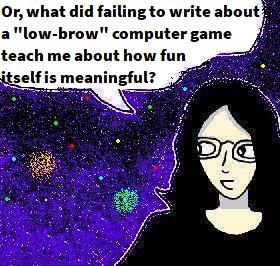
Well, although I hadn’t planned to write another “weird” philosophical article, I ended up writing it after… failing… to write an article about game design. One of the things I sometimes like to do these days is to study how games are designed and compare them to other games in order to spot interesting themes, differences etc…. With more “serious” games, especially horror games, this can be an almost endless source of fascinating stuff to write about.
However… the game I’m playing at the time of writing is a gleefully low-brow “retro-style” dark comedy action game called “Postal: Brain Damaged” (2022). It’s a game about a cartoonishly sociopathic, and thoroughly cynical, “edge-lord” anti-hero who finds himself having a series of bizarre dreams.
It’s a gloriously immature game – filled to the brim with risqué humour, mindless violence, crude toilet humour, goofy pop-culture references, meme culture and stuff like that. A game made to make people aged about thirty or older feel nostalgic about the “controversial” videogames we played when we were younger. To re-experience the feeling of finding a “notorious” game for the first time again.
It’s a really enjoyable game – and I hope to review it – but it’s fairly similar to other “retro-style” games of the type. Likewise, the main point of the game is thrilling fast-paced action and edgy humour. Although there is some topical satire in it, it isn’t really a complex or “high-brow” kind of game. It’s a “mindless” game in the very best sense of the word. The kind of irreverent, over-the-top “laugh out loud” cartoonishly gruesome action-fest that used to be a lot more common during the 1990s and early-mid 2000s.
There wasn’t really that much I could say about it that I couldn’t also say about other games. Yes, I could have talked about how the main character’s one-liners during combat show that “silent protagonists” in action games are kind of boring… but “Duke Nukem 3D” (1996) both proved this point and set the template for this more than two decades earlier. Ditto the game’s style of edgy humour too. Short of actually reviewing the game properly – and I haven’t finished playing it at this point – there wasn’t really that much I could say about it.
Yet, even though it doesn’t exactly reinvent the wheel or contain much in the way of intellectual depth, I still found myself playing it for several hours after abandoning my previous attempt at writing about it. Why? Simply put, because it was fun.
Yes, I could have been doing something “serious” or “meaningful” with the time – learning new skills, looking at “serious art”, watching thought-provoking Youtube videos etc… but I found myself instinctively drawn to playing more of this hilariously silly and utterly mindless action game instead. Because, well, it is fun. In that moment, actually having some fun felt a lot more meaningful than doing anything “worthy” or “serious”.
And this made me think about fun. Yes, the first rule of fun is not to over-think it, but fun often gets a bad reputation these days. A lot of this is probably due to US-style “productivity culture” and the Silicon Valley trend of “optimising” everything. Fun is often seen as a “meaningless” waste of time that could be spent doing “serious” or “productive” things.
Yet, not only are we instinctively drawn to having fun – which makes it a part of the human condition – but it’s often one of the most memorable types of things too. Mostly because it’s something that most people actively want to remember. Even just the memory of having fun can liven up a boring moment. It’s something that is very easy to get nostalgic about, even if you were too busy enjoying it to really remember every exact detail.
Even taking an utterly cynical nihilist approach to the topic – if you’re someone who believes that nothing has any “real” meaning in the grand scheme of things, then you might as well do something that you enjoy if it is all equally meaningless. Do you really think, many years from now, you’ll look back and say to yourself “Oh no! I wish I’d filled out more spreadsheets!” or “Oh no! If only I’d met my five-year productivity goal plan!“.
Yes, fun is often ephemeral and fleeting. It’s an emotion, one evoked by different things in different ways for different people, rather than something that can be neatly quantified and analysed. Yet, perhaps this also lends it more meaning than you might think.
In order to have fun, you have to find or experience things that evoke this feeling in you. You have to learn what you find enjoyable and why – even if it is just to help you find more things that you’ll enjoy. If something is “supposed” to be fun, but you don’t find it to be fun then this might make you question yourself or other people.
In other words, in order to have fun, you have to get to know yourself better. And, honestly, I can’t think of anything more meaningful than that.
——————————
Anyway, I hope that this was interesting 🙂